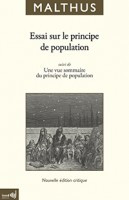Malthus’ Essay: The principle and the controversy

The Essay on the Principle of Population was published anonymously in London in 1798. In it—and in reaction to the philosopher William Godwin’s ideas—Malthus presented his celebrated law: the population always grows faster than “the means of subsistence”, the food supply. Specifically, he asserted that the population grew geometrically while food production increased arithmetically—a thesis that, if accurate, would undermine the very possibility of progress.
La controverse
The text INED has republished here in Eric Vilquin’s French translation sparked a heated debate and controversy. Godwin in particular saw it as his duty to refute Malthus’ fundamental principle. Malthus, he declared, had “entered on a desert land, and, like the first discoverers of countries, set up a symbol of occupation and without further ceremony said, ‘It is mine’”. Malthusian theory was fundamentally “dogmatical”. The main question was whether the forces of procreation were the sole source of population growth. It should be noted that according to Malthus’ “axiom”, human institutions could play no more than a secondary role in population developments.
But how could the population principle be compatible with depopulation? How could entire peoples have disappeared if the driving force of population growth was so powerful? In situations of depopulation, the food supply constraint was clearly not as dire so logically the population should start growing again.
Arguments were sought in the fast-growing United States population. Was the fact that that country’s population had doubled in 25 years, as Malthus showed, due merely to the strength of population growth in a land of abundant resources, or was it the outcome of substantial emigration from Europe at a time when the desire to emigrate was strong?
In the Malthusian model, poverty increases with population size. Was this the effect of a natural law or simply of the “law of very artificial life” (Godwin), which advantaged a handful of individuals? If man’s perfectibility was unlimited, then there was no reason to fear world population growth. According to Godwin, the earth could feed “fifteen individuals instead of one”; i.e. (according to his calculations of the world’s population at the time), 9 billion inhabitants instead of 600 million, especially given the prolific source of subsistence represented by the sea.
Une théorie réaffirmée dans une autre parution de Malthus
This re-edition of the Essay also features Malthus’ Summary View on the Principle of Population, published in 1830, in which the author stands by his population principle despite all the vigorous attempts to refute it. As in 1798, he denounces the unintended consequences of welfare laws, which amounted to “the concession of a right of full support to all that might be born.” The fact was that the wellbeing an individual might be allotted could bring about deterioration for a considerable segment of society. In “the great lottery of life”, he wrote, some would have to “draw a blank”—a statement understood to demonstrate his profound inhumanity and leading Proudhon to retort: “There’s only one man too many on earth—Mr. Malthus”.
Despite a debate that continues today on the basis of different editions of the Essay, Malthus’ population principle marks a major phase in the history of ideas, on the order of Montesquieu’s separation of powers and Darwin’s natural selection.
Source: Essai sur le principe de population
Contact: Jean-Marc Rohrbasser and Jacques Véron
Online: August 2017
